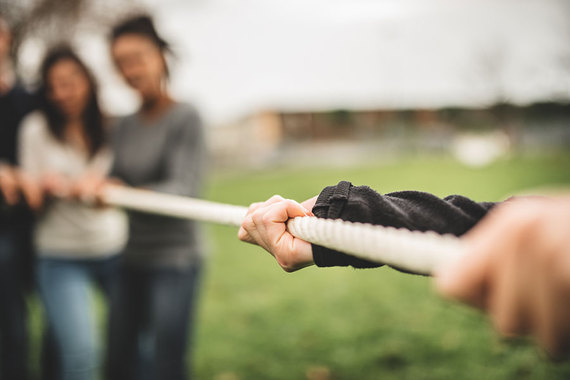With the 2016 election a few weeks away, it is nearly impossible to talk to anyone without the spectacle of the Clinton/Trump race entering the conversation. Most of us connect with like-minded voters who view one or the other of the candidates as grossly unpalatable -- or as the reason we may abandon our beloved democracy should the diabolical opponent be victorious.
Let's get real. No apocalypse is on the horizon. Regardless of who wins this November, the majority of us will remain in our homes and communities, where we will begin the real work of understanding what this election has been about.
Are we prepared to answer the three key questions this election is asking of its citizens and will we like the answers?
1. Who are we as a nation? While both sides feel equally justified in their revulsion against the opponent, very little political discussion affirms the belief that there is "truth" in the experience of every American -- and that in dismissing the experience of another, we reinforce the barriers that keep connection from happening. Would we not be better off as a nation if we could see everyone as equally entitled to their beliefs without the need to tell them why they are wrong, stupid or ill informed? One of the basic tenets of the democracy that we all seem to be trying to save is freedom. If we truly live this value, it is essential that we allow for differences without the need to change or correct the other. If we could stop disparaging those who hold different opinions we may come to see the places of agreement looming larger than those of variance.
2. Where are we headed? Like a ship with a storm looming on the horizon while the crew and passengers are in mutiny, are we better off if we continue battling each other over differences and slights? Or, would we be better served by looking to the larger challenges ahead and figure out how to work together to survive? Optimistic or pessimistic, the truth is that the greatest challenges facing our nation are largely self-inflicted, the result of our inability to address problems as a community without immediately seeking partisan advantage through scapegoating our adversaries as the obstacle to change and progress. In addition to being a guarantee of gridlock, taking such a position is not intellectually honest. It seems only in moments of great disaster are we able to put aside the labels and accept the commonality of humanity, and human kindness, to allow us to help and be helped by whomever shows up on our doorstep. Do we need to continue to chase the disaster to bring us together or can we choose an easier course?
3. Who will lead us? Are we preparing for the real storm that faces the winners of this election? How do we expect our next president and Congress to govern in such a toxic environment? While victory may feel good on election night, what has the victor truly won? A nation at war with itself who now has a President that large majorities feel should either be incarcerated or locked-up. It doesn't bode well for the next four years. I am continually reminded of the Hopi Elders and their wisdom, "We are the ones we have been waiting for." The truth is that solutions will not come from inside the Beltway; they will come from inside each of us. How are we conducting ourselves in our communities? When people don't agree with us, are we allowing our anger to become toxic? Are we afraid of what we don't understand? Are we contributing to the problem or being a part of the solution?
The reason getting angry and battling others is more alluring that creating connections and developing solutions is that is it seems easier to blame others for our problems than to recognize our own role in creating them. The beauty of owning our role in what is happening in our life is that we take back our power to create the solution. Ultimately, all the issues we care about, from a thriving economy to health and security, rest much more in our hands that most of us care to admit -- yet it is the undefined power of our democracy. We get to create what we want.
Perhaps now is the time to stop lobbing assaults at those with whom we disagree and reflect on what we have to offer as solutions to the things that matter most to us. When we root our actions in our ability to change the world we live leadership; and when we live leadership we become the ones we have been waiting for.

